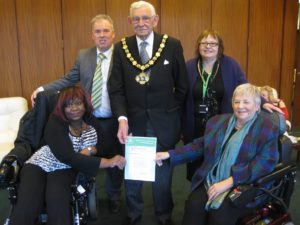User Led Organisation
User Led Organisation (ULO)
Disability Nottinghamshire has been a ULO since its inception back in 1983 as DIAL Mansfield & District. A group of liked minded individuals came together to form a group as they felt there was a lack of independent and impartial advice for anyone with a disability to make informed decisions about their lives. These individuals all had personal experience of disability or had a disability themselves. This ethos remains at the heart of the organisation to this day and encourage any group to follow a similar model.
We were recognised officially as a ULO by Nottinghamshire County Council during a presentation by the Chairman of the Council in 2011. We are very proud of our achievements in being recognised as a ULO but acknowledge that it does not stop here. We want to engage with as many individuals, carers, families, friends and professionals in the future to make sure services are shaped to meet the needs of local people.

Each local authority area in England is required by the Department of Health to have a ULO to consult, engage and involve. There are 21 points which an organisation must meet in order to be classified user led under the Department of Health’s criteria. Some of these include:
– Has a minimum of 75% of the management board drawn from the organisation’s constituency e.g. has a physical disability, learning or mental health difficulties or sensory impairment
– Works from a social model of disability
– Provides support to enable people to exercise choice and control
These are some of the ways in which users are involved at Disability Nottinghamshire:
- Volunteering
- Decision making
- Fundraising
- Consultation and engagement
- Publicity, marketing and events
- Work placements and routes to employment
- Training, skills and education
- Personal development
And some reasons why people have become involved:
- Giving something back to the local community or society
- Raising concerns with the way in which they are receiving a particular service
- Influencing, shaping and contributing to the way services are provided
- Challenging and scrutinising the services, structure and policy of private or public organisations